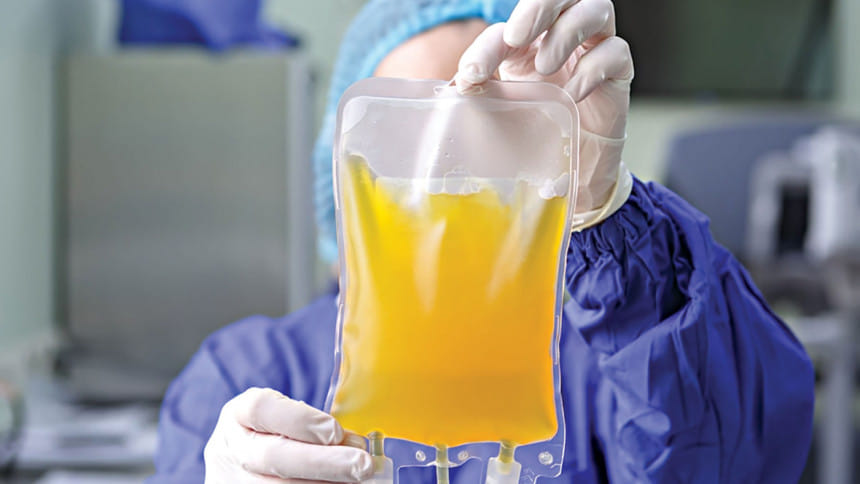Plasma Therapy: Hardly effective on variants from South Africa, Brazil

Researchers in Germany have found that the South African and Brazillian variants of the SARS-CoV-2 virus might be able to evade "plasma therapy".
The study, which was recently published in the scientific journal called Cell, tested to see how well antibodies induced by infection and vaccination neutralise the South African (B.1.351) variant and the Brazillian (P.1) variant of the SARS-CoV-2 virus.
The study was titled "SARS-CoV-2 variants B.1.351 and P.1 escape from neutralizing antibodies".
Antibodies induced by infection exist in the blood of convalescent or recovered patients. These are produced when the body's immune system reacts to the antigen in the virus.
Convalescent Plasma therapy constitutes of taking the blood of a convalescent patient or a person who has recovered from Covid-19 and doing a transfusion into the body of a patient with an active infection.
Previous studies have shown that the antibodies in the convalescent blood fight the antigens in the blood of the patient.
In the absence of any sure-fire treatment, plasma therapy has been commonly used by doctors across the country to try and control the infection since the pandemic started.
However, the study said, "Seven out of nine plasma samples inhibited entry driven by the S [spike] proteins of the B.1.351 [South African] and P.1 [Brazillian] variants less efficiently as compared to entry driven by WT [Wuhan] S protein."
The limitation of the study was that instead of a live virus, they used a "pseudotype" which "faithfully mimics key aspects of SARS-CoV-2 entry into cells [...] and antibody-mediated neutralisation".
"These results suggest that individuals previously infected with WT [Wuhan] SARS-CoV-2 might only be partially protected against infection with B.1.351 [South African] and P.1 [Brazillian] variants of SARS-CoV-2," the study added.
Recently icddr,b conducted a study where they tested 57 samples in the third week of March and found that over 80 percent of patients were infected with the South African variant.
Similarly, Child Health Research Foundation sequenced the genomes of 22 SARS-Cov-2 samples in March and found that 19 were either the UK variant or the South African variant.
The Cell journal article goes on to state that these results suggest that SARS-CoV-2 scape neutralising antibody responses, which has important implications for efforts to contain the pandemic.
The study also found that there was "reduced neutralization by sera from BN162b2 [Pfizer] vaccinated individuals."
"Twelve out of 15 sera showed a markedly reduced inhibition of entry driven by the S proteins of the B.1.351 and P.1 variants," said the study.
"To sum up, these results suggest that BNT162b2 may offer less robust protection against infections by the B.1.351 and P.1 variants."
The Pfizer vaccine however is not used in Bangladesh -- the ongoing vaccination drive uses the Oxford Astrazeneca vaccine. Studies about how well this vaccine performs against the South African variant are yet to be observed.
Similar results were shown by another study published in the Nature Medicine journal last month, titled "Sensitivity of infectious SARS-CoV-2 B.1.1.7 [UK] and B.1.351 variants to neutralizing antibodies" and conducted by researchers from France.
The researchers found that the South African variant may increase the risk of infection in immunised individuals.
They took sera from 58 convalescent individuals and 19 Pfizer-vaccinated individuals. "After 9 months convalescent sera had a mean sixfold reduction in neutralizing titers, and 40 percent of the samples lacked any activity against B.1.351," said the report.
The Pfizer vaccine was similarly "less efficacious against B.1.351", they found.
"Faster-spreading SARS-CoV-2 variants acquired a partial resistance to neutralizing antibodies generated by natural infection or vaccination," said the study, which unlike the German research used the live virus for its testing.
The German study was done by researchers from the German Primate Center, George-August-University Gottingen, Ulm University medical Center, Friedrich-Alexander University of Erlangen-Nuremberg among others, while the French study was done by Institut Pasteur, Vaccine Research Institute, University de Paris, University de Tours, etc.

 For all latest news, follow The Daily Star's Google News channel.
For all latest news, follow The Daily Star's Google News channel. 



Comments